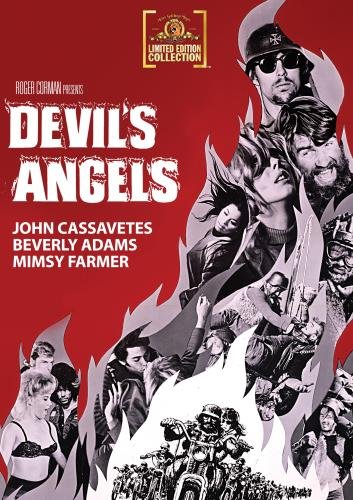
BY ERNIE MAGNOTTA
Biker films have been around for decades.
Although most cinephiles cite Marlon Brando’s The Wild One (1953) as the first great biker movie, it wasn’t until
the mid-1960s and the release of the 1966 Roger Corman-directed classic The Wild Angels that biker films really
exploded onto the scene. Made for $360,000 and grossing close to $16 million, The Wild Angels started a cinematic
cycle trend that lasted well into the 1970s.
Noticing that other enterprising filmmakers
were cashing in on their film’s success, legendary studio American
International Pictures quickly decided that another biker flick was in order.
They gathered Corman (to produce); Wild Angels
scribe Charles B. Griffith (Rock All
Night, A Bucket of Blood, The Little Shop of Horrors, Death Race 2000) to
write and, together, came up with the next biker extravaganza, 1967’s Devil’s Angels aka The Checkered Flag.
Directed by Daniel Haller (Buck Rogers in the 25th Century, The
Wild Racers, Dunwich Horror), Devil’s
Angels concerns a group of rebellious, anti-establishment bikers called the
Skulls who are searching for a police-free place they’ve dubbed Hole-in-the-Wall.
They roll into the small town of Brookville and are immediately ordered to
leave by the intimidated mayor (Paul Myer). The Skulls’ leader, Cody (played by
independent filmmaking icon; the late, great John Cassavetes), informs the
sheriff (Tobruk’s Leo Gordon) that
they’re not looking for trouble and that he, his girl Lynn (the beautiful Beverly
Adams from How to Stuff a Wild Bikini)
and the rest of the posse just need a place to crash for the night. The sheriff
decides to give Cody a chance and agrees to let the group spend the night on
the beach if they promise to remain there and then leave first thing in the
morning. Cody gives his word and the bikers take off along with a local beauty
contestant (Mimsy Farmer from Four Flies
on Grey Velvet) who’s infatuated with the group. The mayor berates the
sheriff for letting them stay in town, but the lawman doesn’t budge. While at
the beach, the group gets the girl high, teases her a bit and sends her running
back to town in fright. The mayor lies by telling the sheriff that the Skulls
raped the unharmed girl and Cody is arrested. When the sheriff learns the
truth, he immediately lets Cody go, but orders him and his friends to leave
town. Meanwhile, the Skulls, who don’t like being accused of rape, decide that
the town needs to be taught a lesson. With the help of a larger group of bikers
called the Stompers, they ride back into town (against Cody’s wishes),
completely take it over and put the authorities on trial. The mayor’s lie is
revealed and he is sentenced to a public beating which Cody goes along with.
The Skulls also feel that, because they were accused of rape, they are owed a
rape. Cody is totally against this. He tries his best to stop it, but all hell
winds up breaking loose. As the Stompers and the Skulls (including Lynn) tear
Brookville apart, Cody, realizing that his Hole-in-the-Wall doesn’t exist,
quits the group and rides off alone before the state police arrive.
With only a $4 million gross, Devil’s Angels may not have been a major
hit for AIP, but it’s still an
interesting and well-done biker film which features several highly recognizable
faces from 1960s/70s cinema and television such as Marc Cavell (Cool Hand Luke), Russ Bender (Bonanza), Buck Taylor (Gunsmoke), Bruce Kartalian (The Outlaw Josey Wales) and Mitzi Hoag (Deadly Game).
Although not nearly as well-remembered as the
Dennis Hopper/Peter Fonda 1969 classic Easy Rider nor as hard-hitting as Al
Adamson’s Satan’s Sadists from the
same year, Devil’s Angels is a solidly-made,
quirky and enjoyable exploitation film that benefits most from a wonderfully
complex performance by the legendary John Cassavetes as well as an entertaining
and thoughtful screenplay by the extremely underrated Charles Griffith. There’s
also a terrific musical score written by Mike Curb and performed by Sidewalk
Productions. Not to mention a catchy theme song by Jerry and the Portraits with
additional music courtesy of Dave Allen and the Arrows.
As far as the Skulls go, they’re mainly
benign (but not as cool as the goodhearted bikers from 1976’s Northville Cemetery Massacre) and just looking for a place to be free.
The havoc they cause (with the exception of an accidental death) is mostly
light (and presented humorously) and they’re never really violent until the
very end, so if you’re looking for an intimidating band of evil hell raisers,
look elsewhere. As for me, I thoroughly enjoy this film; always have. It’s a
fun biker flick with a strong cast and a thought-provoking story. If you’re a
biker film fanatic or just a fan of AIP/Roger Corman in general, I definitely
recommend checking it out.
Devil’s Angels has been released
as a DVD-R from the MGM Limited Edition Collection. The film is presented in
its original 2:35:1 aspect ratio and, although it’s far from Blu-ray quality,
the movie is more than watchable. Also, the audio is clear, and the DVD’s
sleeve and menu feature the original and very cool-looking poster artwork.
